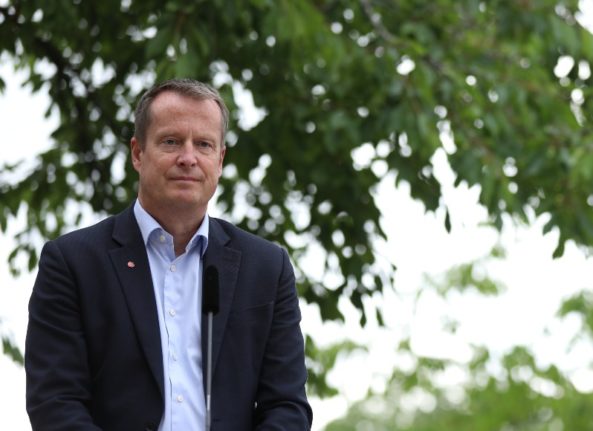Ygeman has in recent weeks announced a succession of new policies aimed at tightening up the rules for work permits and permanent residency, with plans to bring back the old system of labour market testing, bring in a higher minimum salary, and also to make those applying for permanent residency pass language and civic knowledge tests.
Speaking at the Almedalen festival in Gotland, Ygeman told The Local that in his view people living in Sweden on work permits should not feel under attack from the Social Democrat government.
“No, [they should] take it easy. We’re not attacking anybody here on work permits,” he told The Local. “What we want to do is get rid of unqualified labour immigration, and [at the same time] we want to make it easier for people with qualifications to come to Sweden to work, because we need competence from abroad.”
The reforms brought in by the centre-right Alliance government in 2008, he said, had given Sweden “the most liberal labour migration laws in the world”, with negative consequences for both employment and integration.
“We have received over 200,000 people as working immigrants since then, and the majority of them have been unskilled labour or in sectors of society where we have a surplus in the workforce,” he said.
“If you are here doing dishes for 4,000 or 5,000 kronor a month, then I’m sorry, we don’t want to exploit you. And we don’t want want that type of workforce immigration affecting the Swedish labour market, because we received 200,000 people from Syria, and a huge bunch of them are now unemployed, and we need to get them into work.”
READ ALSO:
- What do we know about Swedish language tests for residence permits?
- What do we know about labour market tests for work permits
Employers in Sweden have expressed concerns that bringing back labour market testing, which is used in many other European Union countries to control labour migration from non-EU countries, will make it more time-consuming and complicated to hire international talent.
But Ygeman said the government aimed to work together with employers to design a new system which would be as efficient.
“Firstly, we want to involve businesses, but also trade unions, because that’s the Swedish model, and we want to really hear their views. And after that, we want to have a swift and easy system for those who are in sectors where we really need people. And people who has been exploited in this system or, or in other sectors, will have a very tough time to come to Sweden.”
When it came to the language requirement for permanent residency, Ygeman said that he did not believe the test would make it difficult for businesses to retain skilled international workers, such as computer programmers from India.
“They will be happier to be a part of Swedish society,” he said. “If you’re here for such a long-term stay that you want to become a permanent resident of Sweden, then of course you should learn the language, and we also really want to help them to learn the language.”
“We don’t want people to be just semi-Swedes, like an expat community who only speak to other expats. We really want them to be a part of Swedish society.”
In Denmark, the citizenship test is so difficult that last November, only 41 percent of those taking it were able to pass, and even many native Danes say they struggle with the questions.
Ygeman said that he did not expect the Swedish version to be as challenging, although he added that it would take a year before the details of the language and civic knowledge test had been decided.
“I think we should have a pretty easy, but comprehensive test. If you’ve gone through the C level of Svenska för Invandrare (SFI), you should be able to pass it,” he said.
“We can learn from the Danish experience. We don’t want a test that no one can handle, we want to test that you’re able to manage in Swedish society, knowing basic laws and knowing basic Swedish. And then we’ll have another step for those who want to be Swedish citizens, with a slightly tougher test both on their knowledge of society and their Swedish.”
In a public discussion on segregation, Ygeman took part in near the central square of Visby, Gotland’s capital, he said that he believed that Sweden’s asylum laws were now sufficiently strict, but that there needed to be further tightening up of work permits and of the system for returning those whose asylum applications had been rejected.
“Asylum policy is about right, but I think there’s still a lot to do on returns, and also on labour market migration,” he said.
He said, though, that he doubted whether adopting a stricter policy towards migration earlier would have been enough to prevent the rise of the populist Sweden Democrats, which in 2018 won nearly 18 percent of the vote, coming close to becoming Sweden’s second-largest party.
“I think that they would have been as big anyway, because we’ve seen that even in countries that have had no refugees at all, like Hungary,” he said.
The Sweden Democrats were now losing some of their momentum, though. “There’s a pretty big chance that the Sweden Democrats will lose ground in an election for the first time since they got into parliament.”
That the party was falling in polls though, he argued, was not solely a result of his own party launching a more restrictive immigration policy.
“I don’t think that’s only because of our policy. I think they’re like a broken watch. Whatever the situation, they say we have to have less immigrants. Sometimes, the watch shows the correct time, but the rest of the time, they’re showing the wrong time.”



 Please whitelist us to continue reading.
Please whitelist us to continue reading.
No mention on the separation of families for over a year, absolutely shameful.